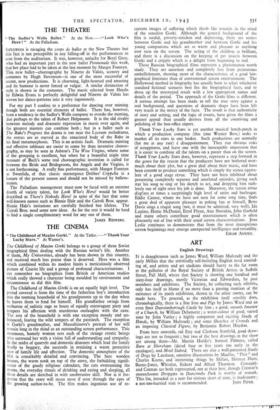THE CINEMA
The Childhood of Maxim Gorki belongs to a group of three Soviet biographical films dealing with the Russian writer's life. Another of them, My Universities, already has been shown in this country, and received much less praise than it deserved. Here was e film which combined within its modest limits a meticulously observed picture of Czarist life and a group of profound characterisations. I can remember no biographies from British or American studios which really showed a character being moulded by environment and circumstance as did this film.
The Childhood of Maxim-Gorki is on an equally high level. The period covered is from the time of the fatherless boy's introduction into the teeming household of his grandparents up to the day when he leaves them to fend for himself. His grandfather swings from outbursts of sadistic rage to bouts of equally extravagant piety and tempers his affection with murderous onslaughts with the cane. The rest of the household is with one exception moody and un- balanced, fearing the wild tempers of the patriarch. The exception Is Gorki's grandmother, and Massalitinova's portrait of her will remain long in the mind as an outstanding screen performance. This enormous, homely woman sees each of the strange erratic beings who surround her with a vision full of understanding and sympathy. In the midst of quarrels and domestic disasters which lead the family finally to beggary, she succeeds in retaining a warm protective core of family life and affection. The domestic atmosphere of the film is remarkably detailed and convincing. The bare wooden houses, the warm nook on top of the stove, the forbidding signifi- cance of the gaudy religious calendars, the cats overrunning the rooms, the everyday rituals of drinking and eating and sleeping, all these details are sketched in with unobtrusive skill. Nor is it for- gotten that the story will mean most if seen through the eyes of the growing author-to-be. The film makes ingenious use of re-
current images of suffering which throb like wounds in the mind of the sensitive Gorki. Although the general background of the film is sordid, poverty-stricken and depressing, there are scenes between Gorki and his grandmother and between Gorki and his young companions which are as warm and pleasant as anything ever seen on the screen. The acting of the children is brilliant, and there is a discussion on the keeping of pet insects between Gorki and a cripple which is a delight from beginning to end.
These Russian biographical films represent a phenomenon worth study. They are unornate and completely free from pretentious embellishment, showing more of the characteristics of a good bio- graphical literature than of conventional screen entertainment. The Hollywood method in biography has usually been to select whichever standard fictional scenario best fits the biographical facts, and to dress up the sterotyped result with a few appropriate names and details of the period. The approach of the Gorki films is different. A serious attempt has been made to tell the true story against a real background, and questions of dramatic shape have been left very much at the mercy of the facts. The result is that authenticity of story and setting, and the logic of events, have given the films a greater appeal than usually derives from all the contriving and polishing of the box-office expert.
Thank Your Lucky Stars is yet another musical hotch-potch in which a production company (this time Warner Bros.) seeks to market all its stars in one basket. Such productions are normally (for me at any rate) i disappointment. They run obvious risks of scrappiness, and leave one with the inescapable impression that it is easier to combine all the talents on a poster than on the screen. Thank Your Lucky Stars does, however, represent a step forward in the genre for the reason that the producers have not bothered over- much about their plot, but a great deal about their music, and have been content to produce something which is simply the screen equiva- lent of a good stage revue. They have not been inhibited about presenting completely separate and unrelated episodes, giving each star his song to sing or his sketch to act, and dropping him ruth- lessly out of sight once his job is done. Moreover, the screen revue displays at times a surprisingly high level of satire and burlesque. Eddie Cantor, whom we have not seen for some long time, finds a great deal of apparent pleasure in poking fun at himself, Bette Davis sings a risque song (not, it must be admitted, very well), Ida Lupino, Hattie McDaniel, Errol Flynn, Ann Sheridan, John Garfield and many others contribute good entertainment which is often pleasantly out of line with their usual screen characterisations. Joan Leslie continues to demonstrate that from the most inauspicious screen beginnings may emerge unexpected intelligence and versatility.
EDGAR ANSTEY.


























 Previous page
Previous page